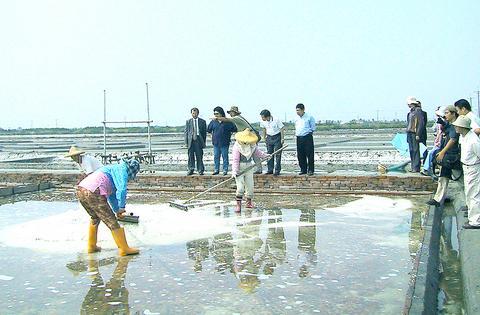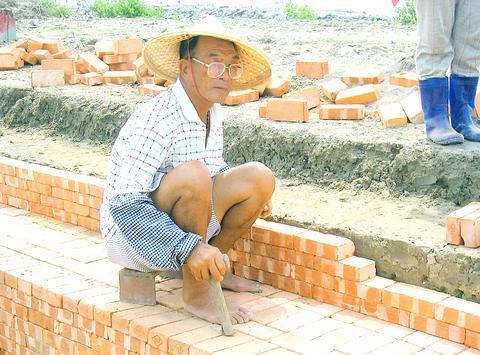Wang He-nan (王河南), a 70-year-old grandfather of five, was born in An-shun (安順), Tainan City. Anshun used to be a village known for its 500-hectare stretch of salt fields. Wang had been helping out in the fields since he was 12; to him, making salt was his life.
In the early 1990s, the traditional method of producing salt manually became obsolete. Furthermore, due to the founding of Tainan Technology Industrial Park in 1991 and the establishment of Szu-tsao Wildlife Protection in the area, Anshun's survival was threatened as the salt plantation was cut down to 300 hectares. By 1994, the salt operations came to an end and Wang was thrown into a panic as his source of making a living had disappeared.
Since then, he had been doing odd jobs, like manufacturing hair clips. Wang could barely make ends meet as his daily wage averaged about NT$200 per day. In June last year, the residents of Anshun were forced to relocate while a team of volunteers stepped in to preserve remaining salt-making sites.

PHOTOS: CODY YIU, TAIPEI TIMES, AND TSAI WEN-PIN, TAIWAN FIELD F
This team of volunteers was led by Kun Shan University of Technology lecturer Lu Chien-ming (盧建銘), who named the volunteer group Taiwan Field Factory, a non-profit organization which aims to reconstruct ecological and archaeological sites in Anshun under the guidance of the Council of Agriculture (COA).
During the period of data research, the group came across Wang and asked for his assistance in data collection. Wang was then hired by Lu's team as a temporary worker and he was assigned to cut grass. After studying the information about former salt fields, Lu's team was inspired to revive the trade that was established in 1919 during the Japanese administration.
In April, Lu's team finally received funding from multiple government administrations, the Council of Labor Affairs (CLA), the COA and the Tainan City Government, as well as donations from the private sector.

After the budget had been approved, the revival program was officially on the road and the salt field area is now known as Salt-Pan Eco-Village. The village is part of a greater scheme -- a cultural village tourism project. It consists of multiple societal, ecological and economical divisions such as Red Forest, a bird habitat area and arts and crafts workshops.
Fifteen former Anshun residents were invited to return to the salt fields. Seven who were experienced in salt making work on the fields, while the other eight are in charge of maintaining the warehouse and irrigation system. Today, the new salt plantation covers 5ha.
Each individual worker works a maximum of 176 hours per month and gets paid NT$95 per hour by the CLA's Well-Rounded Job Development Program.
However, Wang and another worker, who are both over the age 65, do not qualify to receive their wages directly from the CLA due to a senior citizen regulation. Lu, who fought to keep these two experienced saltworkers, decided to pay them out of his own pocket.
Wang acts as the field team leader and his major responsibility is assigning tasks to his co-workers every morning, as well as assisting in the day-to-day operation of the fields. The team starts their day at 7am, gets a rest between 11am and 1pm and works until 5pm.
"For almost 10 years, I could not work on my salt fields and did not have a permanent job -- life was tough then. Thanks to the revival and job development programs, I am now able to get paid to do what I love to do. I am glad to be back to making salt again," Wang said.
The revival program consists of two stages -- societal and economical. From April to January next year, the program is going through the societal stage, where the focus is on rebuilding the salt-making community.
"We are hoping to transform into the economic stage next January, meaning that we will start selling the salt and make a profit," said Tsai Wen-pin (蔡文彬),a member of the field factory and a student of the Department of Architecture and Archaeological Preservation at Shu-Te University.
Tsai said that the unrefined salt produced by the traditional method may be used in preserving fish and plums.
"Next year, we are hoping to sell our salt to plum producers in Mei-shan, a village in Chiayi County which is famous for its plums. In the past, this kind of unrefined but organic salt was used for flavoring; however, today, unrefined salt is replaced by industrial salt," Tsai said.
In addition, salt produced in An-shun can also be sold as souvenirs.
"We are hoping to package the salt into souvenirs, such as amulets containing salt, which are popular in Japan," said Hsu Yang-ming (許陽明), deputy mayor of Tainan. Hsu further stated that the cultural village is expected to be officially opened by the end of this year.
So far, the salt-making project has been very successful, as the area serves many purposes. It fulfills the wish of former residents to return to the fields and also has high educational value as it is already a popular field-trip destination for school children and nature lovers.
"We are now working with the International Field School, the UN and the Sierra Club to promote awareness in the international arena of Taiwan's ecological environment," Lu said.
Hsu shared the same view.
"We are hoping to attract a good number of nature lovers and ecological experts from around the world in the future," Hsu said.
After visiting the salt fields on Thursday, CLA Chairperson Chen Chu (

SHIPS, TRAINS AND AUTOMOBILES: The ministry has announced changes to varied transportation industries taking effect soon, with a number of effects for passengers Beginning next month, the post office is canceling signature upon delivery and written inquiry services for international registered small packets in accordance with the new policy of the Universal Postal Union, the Ministry of Transportation and Communications said yesterday. The new policy does not apply to packets that are to be delivered to China, the ministry said. Senders of international registered small packets would receive a NT$10 rebate on postage if the packets are sent from Jan. 1 to March 31, it added. The ministry said that three other policies are also scheduled to take effect next month. International cruise ship operators

HORROR STORIES: One victim recounted not realizing they had been stabbed and seeing people bleeding, while another recalled breaking down in tears after fleeing A man on Friday died after he tried to fight the knife-wielding suspect who went on a stabbing spree near two of Taipei’s busiest metro stations, Taipei Mayor Chiang Wan-an (蔣萬安) said. The 57-year-old man, identified by his family name, Yu (余), encountered the suspect at Exit M7 of Taipei Main Station and immediately tried to stop him, but was fatally wounded and later died, Chiang said, calling the incident “heartbreaking.” Yu’s family would receive at least NT$5 million (US$158,584) in compensation through the Taipei Rapid Transit Corp’s (TRTC) insurance coverage, he said after convening an emergency security response meeting yesterday morning. National

PLANNED: The suspect visited the crime scene before the killings, seeking information on how to access the roof, and had extensively researched a 2014 stabbing incident The suspect in a stabbing attack that killed three people and injured 11 in Taipei on Friday had planned the assault and set fires at other locations earlier in the day, law enforcement officials said yesterday. National Police Agency (NPA) Director-General Chang Jung-hsin (張榮興) said the suspect, a 27-year-old man named Chang Wen (張文), began the attacks at 3:40pm, first setting off smoke bombs on a road, damaging cars and motorbikes. Earlier, Chang Wen set fire to a rental room where he was staying on Gongyuan Road in Zhongzheng District (中正), Chang Jung-hsin said. The suspect later threw smoke grenades near two exits

The Forestry and Nature Conservation Agency yesterday launched a gift box to market honey “certified by a Formosan black bear” in appreciation of a beekeeper’s amicable interaction with a honey-thieving bear. Beekeeper Chih Ming-chen (池明鎮) in January inspected his bee farm in Hualien County’s Jhuosi Township (卓溪) and found that more than 20 beehives had been destroyed and many hives were eaten, with bear droppings and paw prints near the destroyed hives, the agency said. Chih returned to the farm to move the remaining beehives away that evening when he encountered a Formosan black bear only 20m away, the agency said. The bear